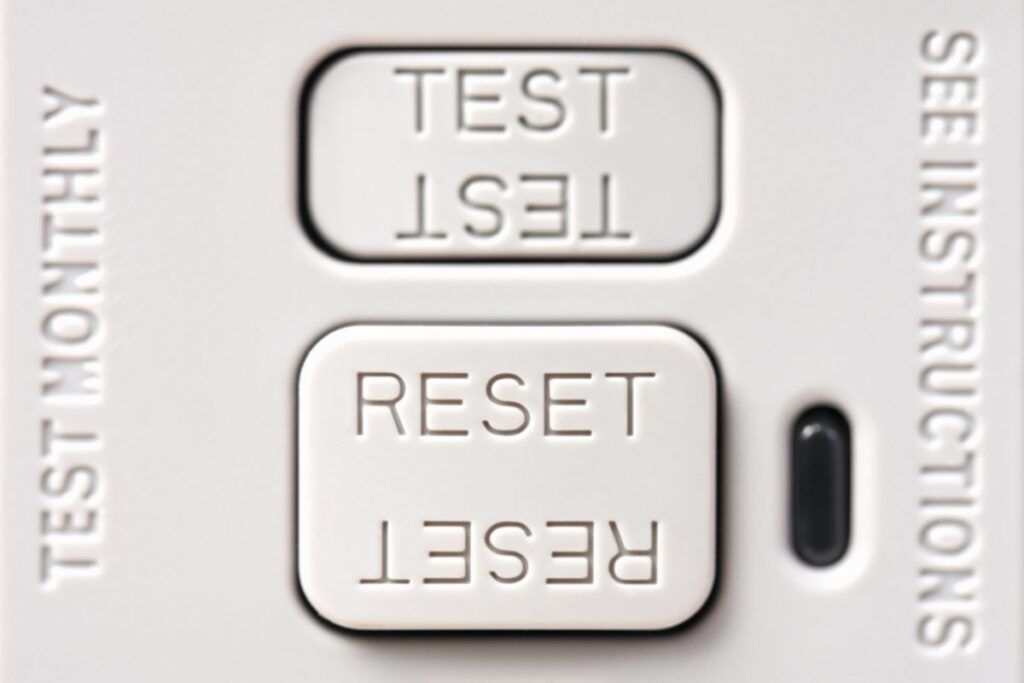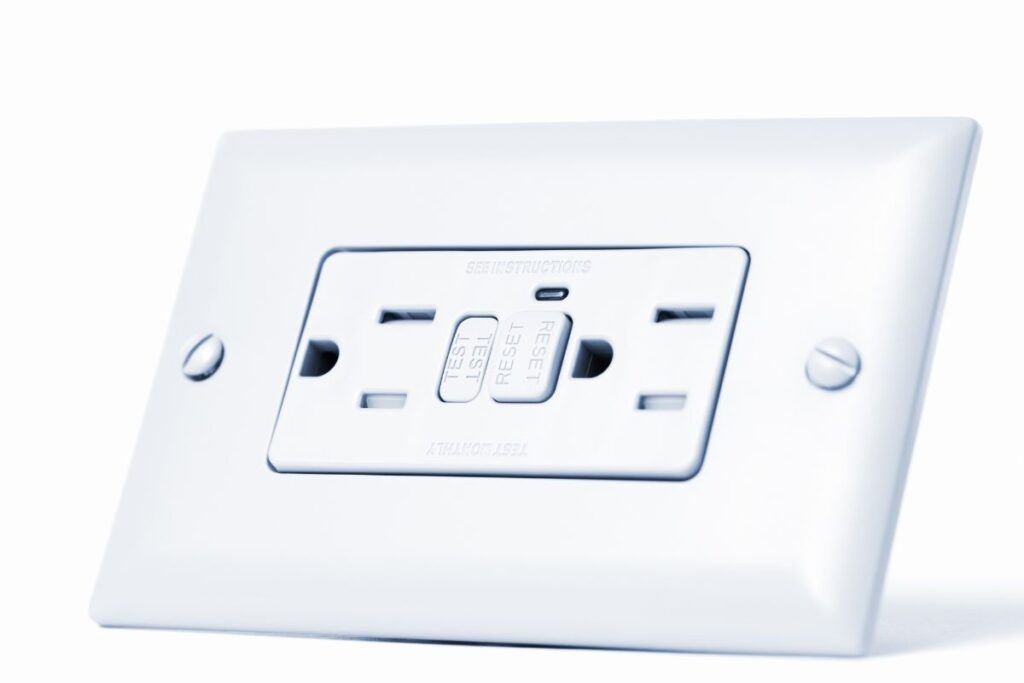GFCI outlets are common nowadays because they save us from dangerous short circuits and electrocution. They trip on their own whenever they detect an issue. But what could be the reason behind GFCI tripping without load? Let’s figure it out.
GFCI outlets may trip without load due to current leakage, damaged insulation and input wires, defective outlet, short circuit, and excessive moisture. Reducing the load and checking the wire insulation is the first step to start. Try to pinpoint the problem and take steps to fix the same.
Ground faults and faulty appliances are also responsible. But, it is seen when you plug in any appliance. Stick to this article till the end to explore the reasons behind a GFCI tripping without load and how you can fix it.

Check out our list of top-handpicked products for all your electrical, appliance, and HVAC system needs to keep your home running smoothly.
This post includes some affiliate links.What is a GFCI outlet?
The term GFCI means Ground Fault Circuit Interrupter.
This outlet is slightly different from the regular outlets.
GFCI trips if it senses problems like overloading, faulty wirings, or short circuits.
It comes with the test and reset buttons used to test the outlet and reset it when tripped.
These buttons are absent in the regular outlets.
Besides, GFCIs are slightly bigger than regular outlets.
Other than these, there are no other differences.
GFCI outlets are mostly used in kitchens, bathrooms, laundry rooms, and garages.
These are the areas with the risk of moisture and overloading.
Let’s examine some reasons behind GFCI outlet tripping without load.
Why is my GFCI tripping without load?
There are various reasons behind GFCI tripping without any load.
If you find the problem without plugging in, then the following conditions could be responsible for your GFCI outlet tripping:
1. Current leakage
The outlet may trip without load due to the current leakage from the wires.
The currents may leak due to the damaged, old, and worn-out input wires.
The wire’s insulation also might be damaged or worn out, causing the current to leak and make the outlet trip without any load.
2. Damaged wires
The damage in the wires can be anywhere besides the input wire.
Pests or insects might have entered and chewed the wires inside, for which the wires have got badly damaged.
Even with no or low loads, the outlet will keep tripping.
3. A loose wire in the outlet
Wiring issues are a real problem in electrical matters.
If your GFCI outlets trip without load, the wirings might be a problem.
The wires have become loose anyhow.
If you do not fix the wires, the outlet will trip without appliances plugged in.
4. Moisture in the outlet
Another major cause behind GFCI tripping without load is moisture.
Somehow, moisture makes its way into the outlet and begins to accumulate inside the outlet.
Outdoor installations and rains are the most common culprits in moisture getting into the outlets.
Another reason is high humidity.
Areas like Florida have very high humidity, resulting in moisture build-up inside the outlet and making it harder to evaporate.
If you suspect such a thing, turn off the circuit breaker and open the outlet box to confirm the problem.
While resetting the outlet, make sure the outlet is dry.
Otherwise, it will trip again, with or without load.
If the outlets are outdoors or near wet and humid areas like kitchens and bathrooms, ensure the box is weatherproof and locked well.
Exposure to moisture can also lead to short circuits.
You can also use a moistureproof GFCI like this one.
5. Faulty GFCI outlet
If there is no problem but still the outlet trips despite having no loads, the problem could be in the outlet.
Maybe the outlet is defective.
The GFCI outlets have a highly responsive internal circuit system that detects maximum electrical flaws and keeps tripping even if there is no load.
You will have to repair or replace the outlet. Call a professional instead to get the job done.
6. Electricity fault
GFCI outlet constantly tripping without any load might be due to electrical faults, like faulty structural wirings, outlet connected to the faulty circuit breaker, etc.
Here also, you will require a professional.
7. Ground fault
A ground fault occurs when a hot wire comes in contact with the ground wire.
The ground wire is not supposed to have any current.
But, if you connect it to the hot wire, it becomes life, and the current starts flowing.
As a result, the wire fails to save you from short circuits.
It starts carrying more current than the circuit.
Ground faults can electrocute people or buildings without GFCI.
But, if you have GFCIs, it will trip off without delay, despite having no load.
You should consult an electrician if the outlet trips due to a ground fault.
8. Defective appliance
Even if there is no load in the GFCI outlet, an outlet downstream connected to a defective appliance can trip the GFCI.
Connecting a defective appliance to the GFCI outlet will make noises like humming or buzzing.
Repeated appliance use will slowly deprive the outlet in the chain of power.
Ultimately, the GFCI outlet will trip.
If one outlet gets affected, all the outlets (even those without load) will get affected.
So, it is necessary to examine all the outlets downstream to see if any such appliances are connected to them or not.
Even if you have only one such appliance connected to the outlet, it will cause constant tripping of other outlets downstream without load.
Also read: Why Does My GFCI Outlet Have No Power?
What should I do if GFCI keeps tripping without load?
When a GFCI outlet keeps tripping, your first job is to find a way to fix it.
But, the methods of fixation depend on the causes of tripping.
Reset the outlet
GFCI outlets come with a set of test and reset buttons.
The first and easy method of fixing the tripped GFCI is to press the ‘RESET’ button.
Pressing the button will restore the power to the outlet and make it active.
However, if there have been some other issues, consult an electrician to find the issue and fix it.
Unplugging appliances
If the tripping happens due to the constant plugging in of the defective appliances, unplug the device.
But first, you have to identify the defective appliance.
Find out which plugged-in appliance makes noises.
Once you unplug the device and see that the outlet has stopped tripping with or without load, you can declare that the appliance was the problem.
But, if the GFCI still doesn’t stop tripping, it may be due to another cause.
Replace the outlet
GFCI will keep tripping with or without load if the outlet is at fault.
In such a case, you have to replace the whole outlet.
It can be due to defective, damaged, or old and worn-out outlets.
You can also install a GFCI at each outlet.
It will prevent the tripping of unloaded outlets due to the defective appliance.
Hire an electrician
You should call an electrician if you cannot understand why the GFCI outlets keep tripping without having any load or appliances plugged into them.
Electricians have good knowledge about these things.
They can help you identify the problem behind the tripping and fix the outlet.
In most cases, the wiring defects will require an electrician, like the loose connections, damaged input wires or insulation, etc.
The electrician than the laypersons better does these.
Besides, some areas do not allow laypersons to deal with electricity.
So, you cannot fix the outlet if you do not call a professional.
Why will GFCI trip if I plug in an appliance?
Have you ever wondered why GFCI trips whenever you try to load something?
It is not yet loaded properly, but it trips whenever you plug in any appliance.
Here are some common reasons:
Loose wire connections
A loose wire connection can make the GFCI trip.
Though there has been no constant load, the moment you plug in an appliance, it will trip.
Call a professional to confirm any loose wire connections or leakage that makes the outlet trip immediately after loading.
Moisture
Moisture accumulation inside the outlet will make it trip whenever you load any appliance.
It occurs mostly in outdoor outlets, kitchens, and bathrooms.
Open the outlet to check the moisture problem and make sure it is dry while putting it back.
Otherwise, the outlet will keep tripping unless it has become dry, with or without load.
You can use a blow dryer, but consult an expert before doing such a thing.
Overload
You might be using an appliance that uses loads of electricity, and your outlet cannot handle such a load.
Such appliances can overload the outlet and make it trip constantly. This tripping is good as it saves you from short circuits.
Do not use such appliances.
Sometimes, overloading can occur due to loose or damaged wirings.
In this case, the GFCI will trip even if there has been no load for some time.
GFCI defect
If none of the above is the problem in your outlet, the last option is a defective outlet.
It doesn’t matter if you load anything or you don’t.
A defective outlet will always trip whenever you try to plug in something or if there is no load.
What other problems a GFCI outlet may face?
Besides so many problems, a GFCI outlet can face many other problems, with or without any load. Below are some common GFCI problems:
GFCI tripping immediately
If your GFCI outlet is tripping immediately after plugging appliances, the reason is probably a defective outlet.
It would be best to replace the outlet.
If the outlet is fine, but it still trips immediately, the problem is in the wiring.
Hire a professional to deal with it.
GFCI breaker tripping
If the breaker is tripping, it could be an old and worn-out breaker, loose or damaged wiring, overloading, or a malfunction in the appliances you have plugged in.
If you cannot understand the problem, call an expert.
GFCI outlets tripping after rain
If the outlet is outside, there are higher chances of the outlet tripping after recent rains.
Rains can accumulate moisture inside the outlet for which it is constantly tripping with or without loads.
If your GFCI is inside, check for leakages from where the water can enter your home and outlet.
Check the appliance you have plugged in if your outlet is protected with covers.
Water can enter the outlet through the appliance if it has a damaged jacket.
GFCI tripping in the rain
If the GFCI trips, rainwater enters the outlet or the power cord.
It occurs when the outlet is outside, and the owner forgot to protect it by covering it.
Also, check the power cord jacketing.
GFCI tripping every few days
GFCI outlets interpreting a surge as the ground fault can lead to GFCI tripping every few days.
Surges do not always occur due to poor wiring systems or power supply malfunction.
Surges also occur by starting heavy-duty appliances, like freezers.
Freezers use a lot of power when they start.
Once the power falls, the extra current drawn is redistributed through the circuit, thus causing a surge.
So, if you have heavy-duty appliances you use once every few days, your outlets tripping after every few days is common.
You should also check for moisture, debris, and insects for GFCI outlets tripping.
In which places the GFCI outlets can trip?

Let’s take a look at the places where this can happen.
Bathroom
Bathroom outlets are prone to moisture accumulation. Somehow, the moisture enters the outlet and gets accumulates inside it.
It causes a ground fault and constant outlet tripping despite having no loads.
If your outlet is protected, the outlet outside the bathroom makes the other outlets trip.
Maybe you have plugged in a heavy-duty or faulty appliance, for which all the other outlets get deprived of power.
Garage
Here also, you need to look for the moisture sources.
Heavy storms and rain can add water to the outlets, especially if they are not covered well.
Insects and debris could also be responsible.
Kitchen
The kitchen is also a moisture-prone area.
So, outlets accumulating moisture and tripping are common.
If moisture is not the problem, see if you use any heavy-duty appliances, like microwaves.
Fridges can overload the outlet and trip it.
Basement
Devices like water heaters and sump pumps staying in the basement can make your GFCI trip frequently because they consume excessive current.
Besides, basements are somewhat damp areas.
So, moisture accumulation in the outlets and outlet tripping are common.
Camper
Poor grounding and reverse polarity in the campers can cause GFCI tripping.
Defecting outlets, wrong wiring, malfunctioning, etc., can cause leakage.
Hot tub
GFCI outlet tripping near the hot tubs includes bad heating, loose connections, burnt wires, or corrosion.
The tub water also enters the outlet and makes it trip constantly.
Generator
Loose connections, worn-out insulation, moisture, and leaks in the generator can make the outlet trip with or without load.
Heated floor thermostat
Wrong wiring in the thermostat can make the GFCI outlet trip constantly with or without any load.
Conflict in the power supply will also do the same thing.
Final thoughts
There could be multiple reasons behind GFCI tripping without load, like leakage, damaged and worn-out wires, loose wires, moisture accumulation inside the outlet, and ground fault.
Even if the outlet is on load, more or less the same reasons are responsible for tripping.
The GFCI trips differently, like tripping immediately, every few weeks, after rains, during rains, or breaker tripping.
Solve the issues whenever you find the real problem. If you cannot find the real cause behind the GFCI tripping without load, call an electrician, especially if the wires or outlets need changes.
Reference: Residual-current device, Electrical circuit.





